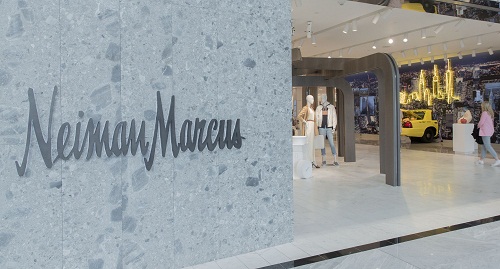FW
 The shutting down of economy has compelled many retailers to go bankrupt. However, the bankruptcy process itself has become a victim of the lockdowns as brands are not able to realize its benefits due to their stores being closed and legal system slowing to a crawl. Top fashion brands and retailers in the US like Neiman Marcus, and a handful of smaller ones like True Religion, John Varvatos have all file for bankruptcy during lockdown. A filing by J.C. Penney is expected soon. Credit agency Moody’s is expecting the default rate for retail and apparel companies to grown now and next year, from around 6 per cent before COVID-a9 hit the world to 17.2 per cent. Meanwhile, J. Crew and Neiman Marcus filed for Chapter 11 bankruptcy protection, with plans for how they could emerge from the process with healthy finances in the space of a few months.
The shutting down of economy has compelled many retailers to go bankrupt. However, the bankruptcy process itself has become a victim of the lockdowns as brands are not able to realize its benefits due to their stores being closed and legal system slowing to a crawl. Top fashion brands and retailers in the US like Neiman Marcus, and a handful of smaller ones like True Religion, John Varvatos have all file for bankruptcy during lockdown. A filing by J.C. Penney is expected soon. Credit agency Moody’s is expecting the default rate for retail and apparel companies to grown now and next year, from around 6 per cent before COVID-a9 hit the world to 17.2 per cent. Meanwhile, J. Crew and Neiman Marcus filed for Chapter 11 bankruptcy protection, with plans for how they could emerge from the process with healthy finances in the space of a few months.
Financial experts point out filing for bankruptcy can protect retailers from economic uncertainty for a few months. Companies may be able to count on their investors to keep them afloat by exchanging debt for increased ownership stakes, explains Susheel Kirpalani, partner at law firm Quinn Emanuel. The investors gambling that their stakes would be able to generate higher returns than the portion of their loans that they would collect from a bankrupt retailer.
Earlier, companies filing for bankruptcy had to indicate if they would be able recover their losses within six months or should their creditors urge a bankruptcy judge to force liquidation. COVID-19 has made this process even more unpredictable, as it has derailed even the most meticulous recovery plans.
bankruptcy judge to force liquidation. COVID-19 has made this process even more unpredictable, as it has derailed even the most meticulous recovery plans.
Liquidating assets for DIP funds
When a corporation files for Chapter 11 bankruptcy, it typically follows one of three scenarios: liquidation, reorganization or sale though some level of liquidation is likely to take place in every case. In each scenario, the company needs finances to keep operating while it works through the bankruptcy process. This money is known as a debtor-in-possession, or DIP, loan, typically backed by a retailer’s assets. To secure these DIP funds, retailers normally liquidate some of their assets which guarantee their lenders at least some of their cash back.
An opportunity to generate returns
For some hedge funds with existing stakes in struggling retailers, bankruptcy is a way to acquire these companies at bargain prices, such as in the case of J Crew and its hedge fund debtor, Anchorage Capital. They see the plunging valuation of these brands and struggling mall retailers as a way to generate returns that exceed the securing finances they provide to these bankrupt brands.
Some bankruptcies are triggered by businesses unable to pay their bills and are compelled to liquidate. These suppliers find themselves at the back of the line for repayment, behind DIP lenders.
A reason to be optimistic
For some of these retailers, bankruptcy is the only path to join the ranks of survivors. For instance, Neiman Marcus and J Crew both successfully refinanced their debt and are on the restructuring trajectory, rather than liquidation. The current uncertainties in the retail industry and the temporary impossibility of liquidation, gives stakeholders a reason to be optimistic about recovery, according to Jonathan Treiber, Chief Executive, Retail Management RevTrax. However, this requires the lenders to be much more flexible than before.
YKK USA has expanded its product range to help manufacturers across the country make products essential to fight COVID-19 pandemic. Best known for zippers, YKK now also offers variety of metal wire, hook & loop, injection moulded plastic parts, webbing, snaps, and buttons that can be used in COVID-19 relief applications.
Applications for the company’s Powerhook extruded hook include foley catheter holders, DVT compression sleeves, endotracheal tube holders, arm boards, blood pressure cuffs, and radial compression devices. The company also offers Sofix for manufacturers of surgical gowns, which incorporates plastic snaps injected onto tape, as well as Powerhook and YKK’s polyester tape. Medical curtain manufacturers can use YKK’s plastic snaps, stainless Snapet, and gypsy stud snaps.
YKK also manufactures back to back hook and loop fasteners, Sofix, plastic detachable clips, and plastic cord stoppers, all of which can be used as ear savers when used in conjunction with face masks. For those manufacturing face masks, YKK offers 3.0 mm and 4.0 mm aluminum wire and 3.0 mm and 5.0 mm elastic tapes e. For medical face shield manufacturers, it produces lastic and metal snaps, hook and loop fasteners, and plastic cord stoppers.
The exports of brassieres by Thailand to the US grew by 53.58 per cent during the Jan-Mar 2020 period. The country shipped $35.12 million brassieres in Q1’20 as against $22.87 million worth of brassieres to US in Q1’19. Volume-wise too, Thailand’s shipments increased by 53.76 per cent to 529,419 dozen of brassieres to the US market.
Percentage-wise growth of Thailand outpaced the performance of all other Asian apparel manufacturing countries including Bangladesh, Indonesia, China, Sri Lanka and India. Vietnam noted double-digit growth of 19.92 per cent in its exports of brassieres to USA in the review period which valued at $87.24 million, benefitting from the fall of China which shipped brassieres worth $144.61 million to the US.
Bangladesh’s exports increased by 4.13 per cent to $36 million worth of brassieres in Q1 ’20. However, volumes fell drastically by 15.20 per cent to stand at 1.31 million dozen. Exports by Indonesia and Sri Lanka too dwindled by 9.52 per cent and 4.69 per cent, respectively, in value terms in brassieres exports to USA, while fall recorded in volume terms was 26.71 per cent and 24.21 per cent, respectively, on the yearly note.
India’s values tumbled enormously by 40.81 per cent in its export of brassieres to US and shipment valued at merely $12.51 million in Q1 ’20 as compared to $21.14 million in Q1’19.
Exporters of the Sanganeri textile say altered consumption patterns and diminished purchasing power in their primary markets — the US and Western Europe — will continue to hurt their livelihoods long after the lockdown is lifted. As per Export Promotion Council for Handicrafts, countries such as the US, the UK, the Netherlands, Germany, France and Italy - account for 30 per cent of the overall export of hand-printed textiles from India in 2018-19.
Officials of Jaipur-based Federation of Rajasthan Handicraft Exporters (Forhex) say, the sector was already suffering from the aftereffects of the implementation of GST when the pandemic struck. In the financial year 2018-19, its exports dipped by 36 per cent year-on-year in the aforementioned countries because of the implementation of GST.
The lockdown has led to cancellation of hand-printed textiles orders worth Rs 1,000 crore for the months of March and April 2020. This may reduce the paying capacity of overseas buyers for the short to medium term.
Bangladesh has sought cooperation from the European Parliament for the restoration of apparel work orders, suspended or cancelled by various European brands and retailers after the COVID-19 pandemic. Cancellation or suspension of work orders has unsettled the sector and forced many owners to lay off workers, says Dr Jafar Uddin, the Commerce Minister in a letter to Bernd Lange, member of the European Parliament and chair of the committee of international trade.
Several thousand poor workers lost their jobs in recent weeks, throwing their lives and livelihoods into dire uncertainty. He urged Lange to take the initiatives to save the lives and livelihood of RMG workers, most of whom are women
BGMEA noted that at present, some four million workers employed in Bangladeshi clothing factories are the most vulnerable as till April 29, some 1,150 apparel factories reported order cancellation or suspension of products worth $3.18 billion.
BKMEA also revealed that its 523 members, out of 833, reported order suspension or cancellation of $1.78 billion.
Picanol rolled off its 100,000th rapier weaving machine at its plant in Leper, Belgium. The 100,000th rapier weaving machine — an OptiMax-i — will be shipped to SAITEX Fabrics, based in Long Tho, Vietnam.
Picanol has an extensive track record in the production of high-tech rapier machines. In 1975, it launched its very first weaving machine with a rapier insertion, which was named the PGW. Since the launch of the first rapier machine all that time ago, Picanol has introduced various new generations of rapier machines. These include, among other machines, the GTM in 1983, the Gamma in 1996, the GamMax in 2002, and the OptiMax and the GT-Max in 2007. Its current flagship rapier weaving machines — the OptiMax-i launched in 2015, and the GTMax-i 3.0 launched in 2018 — cover a complete range of applications.
The Bangladesh Bank has increased the loan limit for garment and textile factories from the Export Development Fund (EDF) to $30 million from an existing $25 million. Members of the Bangladesh Garment Manufacturers and Exporters Association (BGMEA) and Bangladesh Textile Mills Association (BTMA) will benefit the most from the new limit.
The enhanced portion - effective for disbursements until December 31, 2020 - shall be considered by foreign exchange dealer banks (Ads) on a case-to-case basis, depending on the actual needs of factories concerned. Exporters will get loans - from the EDF - at 2 percent interest against their raw material imports.
The Bangladesh Bank has introduced the facility as many exporters failed to arrange a buyer's or supplier's credit facility during the novel Coronavirus pandemic - due to supply chain disruptions.
Additionally, giving exporters relief from the interest rate shock during the pandemic is another reason behind granting the facility, said officials at the central bank.
William Skinner, Chairman, Savile Row Bespoke Association and managing director of Dege & Skinner, says tailors in London’s Savile Row street have called for rent reductions on their stores. Savile Row is a key destination for affluent shoppers visiting London and is also a tourist attraction with its status as the home of tailoring an important part of the overall package that makes the West End of London stand out.
The street has been under pressure for some time with relatively low margins, the rise of relaxed dress codes, higher business rates and rising rents all conspiring against it. Now a number of suit-makers on the street are asking for rent cuts and greater flexibility over payment terms.
The Pollen Estate is the biggest landlord in the area and has been mulling rent-free periods, rent deferments and monthly rents for reopening businesses. But recent periods have seen tailors like Hardy Amies, Chester Barrie and Kilgour either closing completely or exiting the street. And there are fears that after the crisis are over, if tailors can't afford the rents and if other retailers with deeper pockets are prepared to move in, the character of the street could change forever.
Policymakers worry the knock-down effects of April's historically low exports may cut short outbound trade in FY21 as the March-June period is crucial in the export cycle for many sectors such as apparels and engineering goods. Data released by the Commerce and Industry Ministry shows, India’s exports dipped 60.28 per cent in April to $10.36 billion shrinking for a second straight month as the COVID -19-induced lockdown took its toll on trade with other countries.
The rate of fall in outbound trade was the most since at least April 1, 1995, as manufacturing units remained shut for the first 20 days owing to the nationwide curbs, and faced major logistics and supply-side hurdles later on. The country’s exports had declined by 34.57 per cent in March.
Readymade garments, the sector in which India’s export competitiveness has steadily fallen over the past financial year, managed to push out just $126.31 million in April, registering a 91 per cent fall.
Receipts from the volatile processed petroleum exports fell by 66 per cent in April to just $1.24 billion as global oil prices crashed amid a major slump in -oil and non-gold imports declined by 52.08 per cent.
 A recent webinar on retail and ecommerce by CommerceNext, for marketers in New York showed, the global apparel sector is cautiously optimistic as around 49 per cent apparel retailers reported a jump in their online apparel sales from March 29 to April. Sucharita Kodali, Vice President and Principal Analyst at Forrester Research, and J Bennett, Vice President Operations and Corporate Development at fraud protection platform Signifyd shared this view. Kodali said, apparel retailers are rapidly moving towards their sales goals by exploring the e-commerce platforms.
A recent webinar on retail and ecommerce by CommerceNext, for marketers in New York showed, the global apparel sector is cautiously optimistic as around 49 per cent apparel retailers reported a jump in their online apparel sales from March 29 to April. Sucharita Kodali, Vice President and Principal Analyst at Forrester Research, and J Bennett, Vice President Operations and Corporate Development at fraud protection platform Signifyd shared this view. Kodali said, apparel retailers are rapidly moving towards their sales goals by exploring the e-commerce platforms.
Around 43 per cent retailers reported their online sales tracking significantly ahead of their set goals. Another 56 per cent retailers credited this bump to store traffic migrating online, while 49 per cent attributed it to driving demand via marketing.
Intimate brands benefit as ecommerce sales surge
Rebecca Traverzo, VP-marketing at Thirdlove said, intimate brands are benefiting the most from this trend as consumers are feeling a lot more confident in the economy and are less concerned with a possible recession. They are spending money not only on essentials. Seeing this positive trend, the brand is cautiously planning its future actions.
in the economy and are less concerned with a possible recession. They are spending money not only on essentials. Seeing this positive trend, the brand is cautiously planning its future actions.
Bennett views fashion and footwear as the two e-commerce verticals to have overcome challenges and continue selling during the pandemic. Though both these categories saw a pullback early on as consumers flocked to essential retailers for their online shopping needs, they have seen resurgence in the weeks since.
Signifyd also revealed though gross merchandise value (GMV) for fashion purchases that averaged $250 or less was at its lowest in the week of March 16, it has skyrocketed more than 50 per cent by April 13. A reason for this could be that retailers have been able to refocus efforts to delivering online, opined Bennett. They’ve gotten their fulfillment centers deemed to be essential, set up safety requirements so that their employees can work safely in these.
Product launches, efficient marketing mantra for success
Bennett also emphasized that many of these sales are driven by promotions, which makes it unclear just how much of these need to be maintained. In fact, there was a major difference in the dynamic between fashion purchases averaging $250 or less, versus the much smaller segment of those averaging between $250 and $550. These purchases peaked during the week of March 23 due to excessive promotions timed with new product launches, before leveling off in the two weeks afterward. Bennett said new product launches, when handled with efficient marketing are experiencing excellent success.
Though ThirdLove too experienced similar rebounds from both CommerceNext and Signifyd starting from April, the company has not done promotions or discounts for its brand throughout the pandemic. Moreover, they are seeing a drop in returns during COVID-19. It has also opened up a partnership with Returnly for customers to be able to return packages at their local establishes. Even Signifyd revealed a 25 per cent decline in returns due to lack of access to process a return, and new users typically generating lower return rates.












